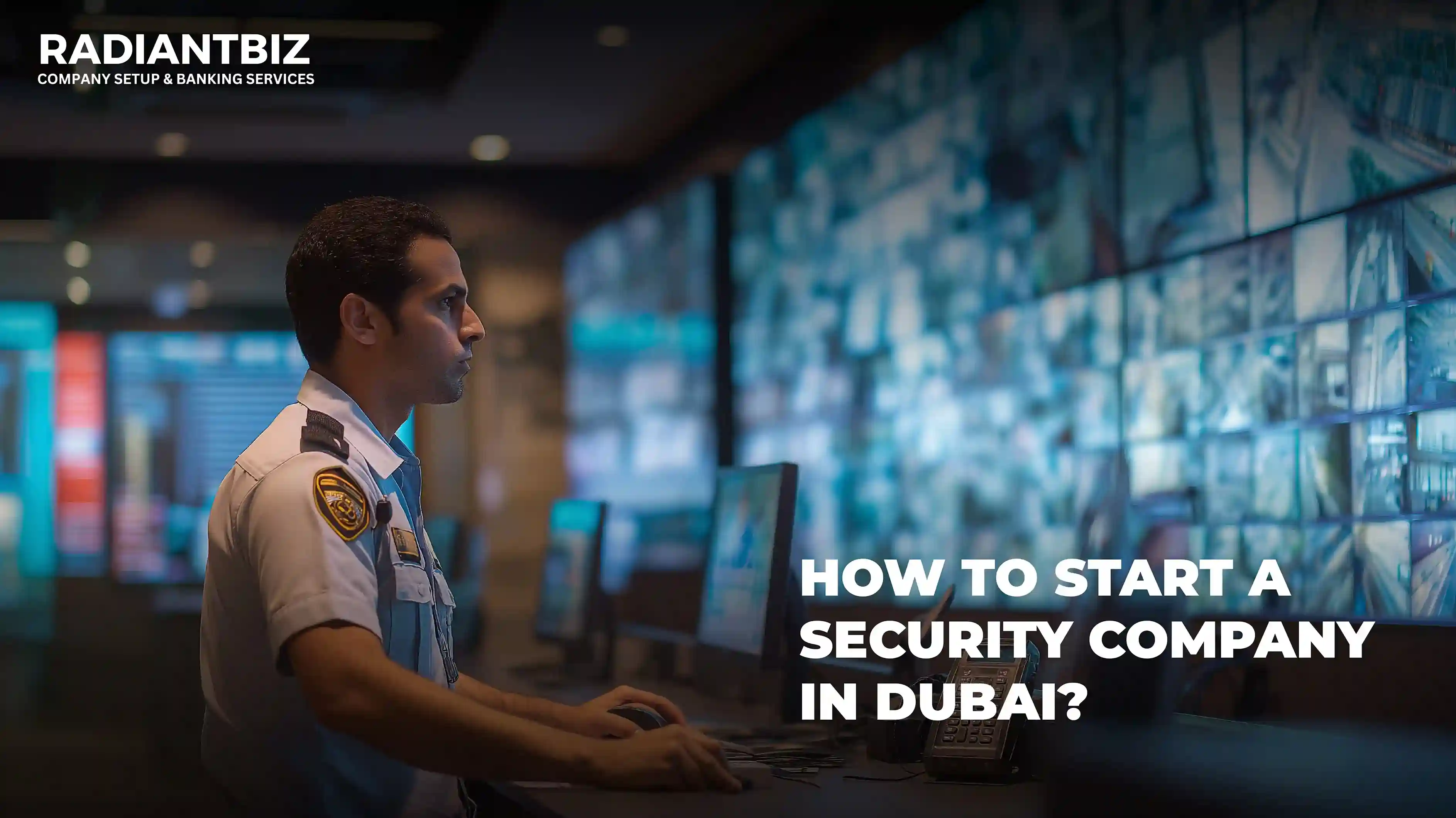How to Start a Security Company in Dubai?


Table of Contents
Wondering about the requirements to start a security company in Dubai? Good, you're on the right track! Dubai's need for qualified security services continues to increase, for residential compounds, hotels, events, corporate towers, and retail centers, all require trustable teams.
Having assisted numerous startups in establishing over the past ten years, one thing is evident: the firms that get the paperwork, training, and budgeting correct from day one, win contracts quickly.
In this guide, we'll lead you through the real-world requirements, provide actual examples from the field, and provide the checklist you can use to proceed with confidence. No hype—just the steps that count.
Table of Contents
- Why do security companies thrive in Dubai?
- Understanding the Licensing and Regulatory Requirements
- Making the Decision Between a Mainland and a Free Zone Setup
- Costs and Budgeting
- Staffing, Training and Operations
- Marketing and Winning Clients
- Common Mistakes to Avoid
- Final Note
- FAQs
Why do security companies thrive in Dubai?
Dubai is a trust and reputation-based economy. When clients engage a security firm, they want evidence: insured personnel, certified training, and prompt response capability.
Demand is no longer for guards, clients demand technology, professional behavior, and a good operations infrastructure.
We worked with a founder who based his company on two things: being on time and visible professionalism (uniforms, branded cars, electronic reporting).
In six months, he replaced three smaller rivals away from a large mall account, the customers informed him they preferred consistency over the low prices.
Understanding the Licensing and Regulatory Requirements
In order to work legally, you have to adhere to a couple of very strict guidelines. The most crucial regulator you will ever have to deal with is SIRA (Security Industry Regulatory Authority), which controls private security in the UAE and issues obligatory approvals.
Most important requirements to begin with:
- SIRA approval and company licensing, as well as individual personnel (guards, supervisors, managers). Every security personnel has to carry a valid SIRA card.
- Trade license from the Department of Economy and Tourism (DET) for mainland entities, or equivalent free zone authority in the case of selecting a free zone (*note: free zone suitability differs for security activities).
- Company documents: trade name reservation, Memorandum of Association (if LLC), passport copies of shareholders and visas, and Emirates ID copies for UAE residents.
- Training certificates for supervisors and guards issued by SIRA-approved training institutions.
- Medical certificates of fitness for staff and documentation of background checks as necessary.
- Office verification: actual office location (virtual offices could be unacceptable for some security activities).
- Insurance: liability and workers’ compensation policies commensurate with the size of your operation.
- Practical tip: Begin SIRA training early. The training timings can occasionally be fully booked, and postponing it sets back each subsequent step. Schedule training for your initial batch of staff the same week you apply for preliminary approvals.
Making the Decision Between a Mainland and a Free Zone Setup
Your decision regarding a jurisdiction will influence who you can sell to and how you organize ownership.
Mainland (DET)
Suits better for servicing government contracts, malls, hotels, and residential developers.
Easier to secure local tenders.
May necessitate a local service agent or local partner based on the company structure (although recent liberalization has relaxed foreign ownership regulations in most sectors).
Free Zone
Simpler setup in some instances and zero corporate tax for most activities.
Some free zones limit security-related activities or prohibit the ability to contract with mainland entities.
Better suited for security companies providing consultancy, technical solutions, or remote monitoring services, but not on-ground deployment of guards.
- Real-world example: A client started in a free zone to export CCTV systems to the world, but when he attempted to bid for a Dubai mall contract, he was informed that only mainland-licensed suppliers would be accepted. He needed to reapply for a license on the mainland—a setback that lost him a tender opportunity.
If your plan includes supplying guards and providing on-the-ground security, a mainland setup is usually the safer choice.
Costs and Budget Planning
Budget realistically. Below is a practical cost guide based on actual setups we’ve guided:
One-off and setup costs (approx.):
Trade license (mainland): Starting from AED 12,000
SIRA company certification and approvals: Starting from AED 3,000, depending on the services provided
SIRA training per person: Starting from AED 2,000, depending on whether the personnel is a guard or a supervisor
Office fit-out: Starting from AED 5,000 initial (depending on fit-out)
Insurance: Starting from AED 5,000+ per year
Equipment (radios, uniforms, CCTV kit): Starting from AED 10,000, depending on scale
Recurring monthly expenses:
Salaries (guards): Starting from AED 1,500 per guard (entry packages vary)
Visa maintenance per employee: Starting from AED 200 monthly equivalent (varies)
Rent, utilities, vehicle leases: depends on scale
*Mini-budget example (small guard-only company, first 6 months):
Licenses & approvals: Starting from AED 25,000
Initial training (10 guards): Starting from AED 30,000
Equipment & uniforms: Starting from AED 20,000
Office + misc: Starting from AED 15,000
Total initial: Starting from AED 90,000 (approx.), retain 20% contingency.
- A lesson learned: Founders who undercapitalize find it hard to win larger contracts that involve upfront deployment expenses. When a tender requests a 30-guard deployment in 2 weeks' time, you will need payroll and equipment to be ready.
Staffing, Training, and Operations
Recruitment of the right staff is business critical. SIRA requires standard training, but operational preparedness exceeds compliance.
Staffing checklist:
- Hire SIRA-approved guards or have recruits undergo training prior to deployment.
- Appoint a certified operations manager with shift planning and client reporting experience.
- Implement HR procedures for onboarding, medicals, and payroll.
Training modules:
- SIRA guard basic training curriculum
- First aid and fire safety qualifications
- Customer service and de-escalation skills
- Supervisor and incident report training
- Operational tips:
1. Employ a digital patrol management system for proof-of-service and client transparency. Clients increasingly demand real-time reporting and incident records.
2. Standardize SOPs for everyday situations (lost property, medical event, access control violation).
3. Plan frequent refresher training, SIRA and customers alike seek ongoing compliance.
Through hands-on experience, firms that invest in a modest operations dashboard (even a basic smartphone app with time-stamped check-ins) gain more renewals. It's a modest expense with a high trust dividend.
Marketing and Winning Customers
Security sales rely on trust, references, and exposure in the proper venues. Successful channels consist of:
- Tender sites and local authority procurement websites.
- Facilities management networks establish relationships with property managers.
- Short-term contract event planners and hotel operating teams.
- LinkedIn outreach and case-study material demonstrating SIRA compliance and response times to incidents.
- Sales tips: Provide a brief pilot or trial service to demonstrate capability. We recommended a client to do a two-week pilot for a hotel at a discounted rate. Following the pilot, they signed a full-year contract because the hotel management prioritized reliability over cost.
Pricing must consider not only labor costs but also overheads, training, insurance, and a buffer for equipment replacement. Include proof of SIRA-certified personnel and an operations plan when bidding, these reduce procurement check times.
Common Mistakes to Avoid
To prevent delays and damage to reputation, be aware of these errors:
Underestimating training lead times: SIRA slots get taken. Reserve early.
Overlooking jurisdiction restrictions: Free zones might limit market access.
Neglecting to budget for audits and renewals: Refresher courses and license renewals contribute to recurring expenses.
Bad contract terms: Don't agree to long-term deals without rate review or additional staffing clauses.
One business owner whom we counselled agreed to a 12-month low-margin deal, then got hit with increasing wage bills. Negotiate escalation clauses to preserve margins.
Insurance & Risk Management: Insurance isn't optional, it's a fundamental aspect of trust. You need to factor in public liability, employer liability, and equipment cover. Higher-risk deals (events, VIP coverage) take higher limits and special policies. Include simple risk checks in all contracts to cap your exposure.
- Typical timeline estimate
From planning through to initial contract, a reasonable time frame for a small security firm is 6–10 weeks: 1–2 weeks company setup, 2–4 weeks SIRA approvals and training (if available), and 2–4 weeks recruitment, purchasing kit, and pilot runs.
Final Note
If you’re serious about how to start a security company in Dubai and its requirements, focus first on compliance, then on building a reliable operations core.
Get your SIRA approvals and training scheduled early, choose the right jurisdiction, plan a conservative budget, and invest in staff training and simple digital tools. Those actions will make your bids stronger and your operations smoother.
Seek our professional on-the-ground guidance, contact us via mail at info@radiantbiz.com, WhatsApp, or call us at +971521322895!
FAQs
Q1: How long is the SIRA approval?
Standard SIRA approval and training booking takes 2–6 weeks based on course availability and document completeness. Allow for potential delays.
Q2: Is it possible for a foreigner to establish a security company in Dubai?
Yes. Rules on foreign ownership have changed, but SIRA compliance and proper company structure (free zone vs mainland) are necessary. Use a local consultant for up-to-date requirements.
Q3: Do security companies in Dubai need a physical office?
Physical offices are necessary for most security operations to store equipment, conduct training, and operate from. Virtual offices might not



2.png)




.avif)